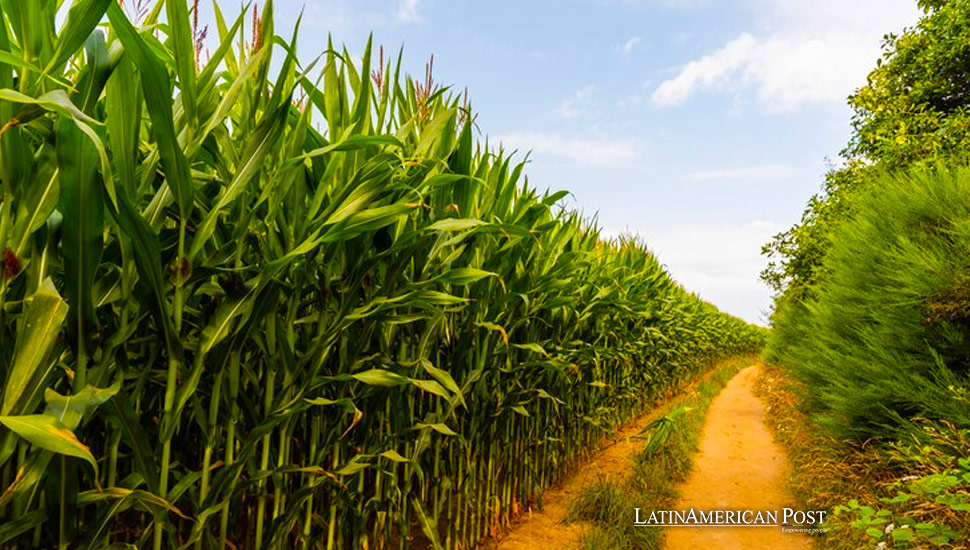Climate Change Fuels Insect Plague in Argentine Cornfields

Argentina, a top global corn exporter, faces a growing threat from the leafhopper, an insect thriving in warmer temperatures and jeopardizing millions of tons of corn due to its spread.
In Argentina’s vast cornfields, a new menace has emerged, small in size but colossal in impact. The leafhopper, a tiny yellow insect just four millimeters long, thrives in the increasingly warm climate and wreaks havoc on the nation’s corn crops. This development is alarming for Argentina, the world’s third-largest corn exporter, which has already seen its harvest projections drastically reduced by millions of tons due to this pest.
The Rise of the Leafhopper
Traditionally confined to the warmer northern regions of Argentina, the leafhopper is venturing into new territories, propelled by rising temperatures that favor its reproduction and survival. Unlike previous years, when frost helped control its population, recent milder winters have allowed the leafhopper to flourish unchecked, leading to unprecedented infestations.
Farmers are concerned that these infestations may become more frequent, with a decrease in frost events that previously helped control the insect population in recent years. Additionally, forecasts for a warmer winter suggest further challenges in managing the spread of the insect, according to analysis by Reuters and insights from farmers and weather experts.
“The number of days with frost is becoming less frequent due to global temperatures rising,” explains Matilde Rusticucci, a climate change specialist at the University of Buenos Aires. She notes that minimum temperatures in the country have “increased steadily,” creating ideal conditions for the leafhopper to thrive. The year 2023 was declared the warmest year in recorded history, further aiding the spread of these pests beyond their usual habitats.
Impact on Agriculture
The consequences for Argentina’s agriculture are severe. The leafhopper carries a stunt disease that damages the cobs and kernels of corn plants, significantly reducing the quality and quantity of the harvest. This year alone, the infestation has led to a loss of approximately 10 million tons of corn, a substantial blow to the country’s economy and status as a critical player in the global corn market.
Farmers, deeply concerned by the recent trends, are considering significant changes to their planting strategies. “Many are going to reduce their hectares of corn to zero,” stated Anibal Cordoba, a producer in northern Chaco province. Without a hard freeze this winter to curb the leafhopper population, many fear the situation could worsen next season, prompting a shift to other crops like soy, unaffected by the bugs.
Wider Implications and Responses
The leafhopper plague is a local issue and a symptom of broader environmental changes affecting agricultural patterns worldwide. In Argentina, it highlights the farm sector’s vulnerability to climate change, underscoring the need for adaptive strategies to cope with new challenges. This includes developing and planting crop varieties resistant to pests and diseases and integrating more sustainable farming practices to enhance resilience.
Moreover, the situation calls for a coordinated effort among agricultural scientists, climate experts, and policymakers to address the root causes and mitigate the effects of climate change on farming. Investments in research and development for better pest control technologies and techniques are crucial, as is the need for policies that support farmers in their transition to more sustainable practices.
Local and Global Relevance
The crisis also has significant implications for global food security, as Argentina is a major supplier of corn worldwide. Any substantial decrease in corn production can have ripple effects across international markets, affecting commodity prices and food availability worldwide.
In response to the escalating threat, Argentine agricultural agencies and research institutions are ramping up their efforts to study the leafhopper and its behaviors. Understanding the pest’s life cycle, migration patterns, and interactions with crop species will be vital in developing effective control measures and preventing future outbreaks.
Community and International Collaboration
There is a growing recognition of the importance of community-level action and international collaboration in tackling such environmental and agricultural challenges. Farmers are increasingly engaging with experts and officials to share knowledge and resources, and there is a concerted push to foster partnerships beyond national borders to learn from the experiences of other regions facing similar issues.
Also read: Argentina’s Economy Dips 3.6% Amidst Harsh Fiscal Adjustments
As Argentina grapples with the implications of this new agricultural threat, the fight against the leafhopper is set to be a crucial test of the country’s ability to adapt to the changing climate. It will require innovation, collaboration, and a committed response from all sectors of society to safeguard the future of agriculture and maintain its position in the global market.





